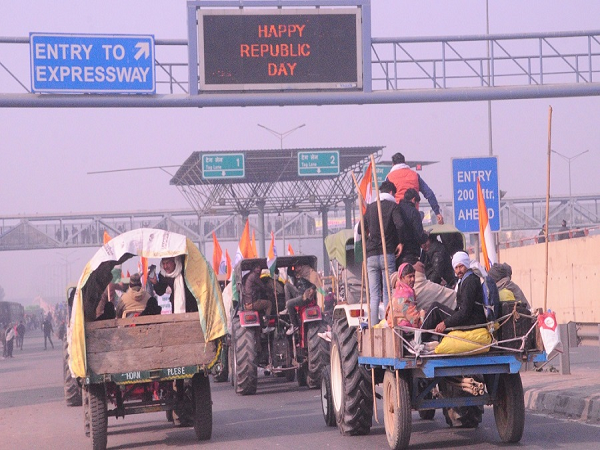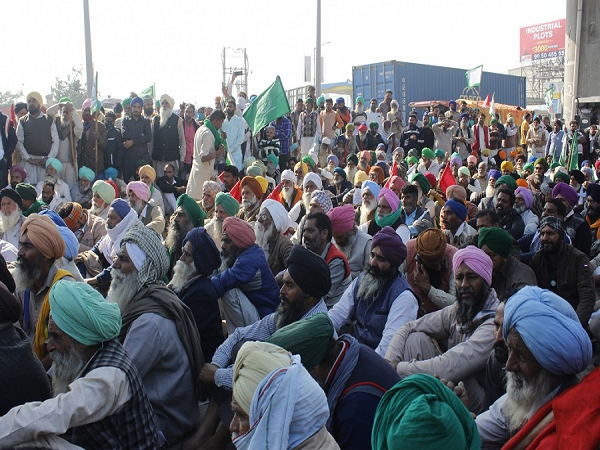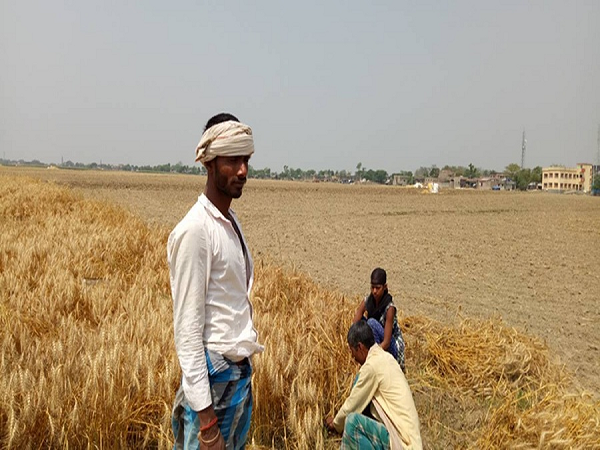
by admin | May 25, 2021 | News

He says BJP’s troll army intimidating him, giving call to gather outside his residence
NEW DELHI — Swaraj Party chief Yogendra Yadav is facing intimidation by the Bharatiya Janata Party (BJP) supporters. His personal number has been leaked, allegedly by BJP’s troll army, after which he is receiving “hundreds of abusive and threatening phone calls”. The saffron brigades also plan to gather at the residence of Yadav, who has emerged as a prominent face of farmers’ resistance movement.
On Thursday, Yadav said through a tweet that BJP supporters have given a call on social media to gather outside his residence in the evening.
He said he was going to inform the Delhi Police about his personal number being leaked. Yadav said he is not going to be intimidated by threat calls and crowd gatherings.
Yadav has been the target of Hindutva forces for his political opposition to the Narendra Modi government. He is one of those leaders who have been booked by the Delhi Police for violence that erupted during a tractor rally by farmers on the Republic Day.
Yadav is among the top leadership of farmers who have denounced the Red Fort incident and distanced themselves from the ensuing violence. Yadav was quick to appeal for calm and urge the protesters to follow the designated route permitted by the Delhi Police.
“I appeal on behalf of the Samyukt Kisan Morcha to all farmers not to pay attention to rumours, and also appeal to them to return to their designated routes. Please don’t do anything that tarnishes the farmers’ movement,” he had said in messages broadcast through the media.

by admin | May 25, 2021 | News

Delhi Police arrests 19 people and files more than 25 cases over Republic Day violence
NEW DELHI – The agitating farmers have suspended their plans for a march to parliament next Monday, the day Finance Minister Nirmala Sitharaman is scheduled to unveil country’s annual budget. This was announced on Wednesday by the Sanyukt Kisan Morcha (United Front of Farmers) at Sidhu border following violence that marred the massive tractor rally a day earlier.
“1st Feb’s march to parliament is postponed. We will have a jan sabha (public meeting) and anshan (hunger strike) on January 30 which is Mahatma Gandhi’s death anniversary,” Morcha leaders said while apologising to the public for the chaos and unrest of Tuesday.
The Morcha, representing over 30 farmer unions fighting for repeal of three controversial farm laws, also resolved to continue this agitation and appealed to the farmers to stay on the protest venues and continue a peaceful struggle.
Tens of thousands of protesting farmers have been camping on the outskirts of Delhi for two months refusing to budge till the government scraps the laws.
Most of the constituents of the Morcha held an emergency meeting under the chairmanship of Shri Balbir Singh Rajewal. Sincere appreciation was conveyed to the struggling farmers for extending an unprecedented response to the Kisan Republic Day Parade.
They discussed the violent incidents in New Delhi and concluded that the “government has been severely shaken by this peasant agitation. Therefore, a dirty conspiracy was hatched with Kisan Mazdoor Sangharsh Committee and others against the peaceful struggle of other farmer organizations, who had set up their own separate protest site after 15 days of beginning of this farmers’ agitation. They were not part of the organisations which jointly undertook the struggle,” they said.
They resolved not to allow the government and other forces inimical to the peaceful movement to break this struggle. More than two lakh protestors “joined yesterday’s rally. 99.9 per cent protesters were peaceful. It was a target of government’s conspiracy,” Balbir Singh Rajewal, one of the senior leaders of the farmers’ movement told a news conference at Singhu, one of the epicentres of the sit-in protests.
He and other protest leaders accused Punjabi actor Deep Sidhu and a union Punjab Kisan Mazdoor Sangharsh Committee of a role in diverting the tractor rally from the agreed route and storming of Delhi’s historic Red Fort.
“These miscreants had declared that they will go to Red Fort. They had a deal with government. Authorities let them easily enter Red Fort. Deep Sidhu is Amit Shah and (PM Narendra) Modi’s agent,” Rajewal said.
Congress and Aam Admi Party, in separate press conferences, also called Sidhu an agent of the BJP. They also showed his photographs with Modi and Shah as proof of their respective claims.
Meanwhile, the rift within the farmers’ groups surfaced as two groups pulled out of the protest against the Centre’s three farm laws on wednesday. “We can’t carry forward a protest with someone whose direction is something else,” said V.M. Singh of the Kisan Sangharsh Committee. A faction of the Bharatiya Kisan Union also dissociated itself from the movement.
Nineteen people have been arrested and more than 25 cases registered over the violence during Republic Day’s tractor rally, the Delhi Police said on Wednesday, adding that they are investigating the farmer groups’ leaders in connection with the violence.
Around 400 police personnel were injured in the day-long clashes, which started as the farmers broke barricades and tried to enter Delhi way ahead of time and deviated from the planned route which had been cleared for the rally.
At least 45 Delhi Transport Corporation (DTC) buses were damaged in Tuesday’s violence. “As of now, I can only say that information we have received that 45 buses got damaged in Tuesday’s protest. A meeting of senior officials is scheduled to review the matter,” official at the DTC head office told IANS.

by admin | May 25, 2021 | News

“Despite no violence at the Ghazipur protest site, the government is trying to crush the farmers movement. This is the real face of Uttar Pradesh government,” Tikait said.
NEW DELHI — Bharatiya Kisan Union (BKU) leader Rakesh Tikait, who has been named in the Delhi Police FIR in connection with the violence during the ‘Kisan Gantantra parade’ on Republic Day, said that the Uttar Pradesh Police has come to arrest the agitating farmers.
In an address from the dais of the farmers’ union at the Ghazipur protest site, Tikait said: “Uttar Pradesh Police is trying to arrest us. Even the Supreme Court has favoured peaceful protest. There was no violence at the Ghazipur protest site.”
“Despite no violence at the Ghazipur protest site, the government is trying to crush the farmers movement. This is the real face of Uttar Pradesh government,” he said.
His remarks came after there was heavy deployment of police and security personnel ast the Ghazipur protest site.
Tikait also stressed that no farmers have disrespected the Indian national flag.
He also demanded for a Supreme Court monitored probe against Punjabi actor Deep Sidhu, who was one of the persons who hoisted a pennant from the ramparts of the Red Fort.
Tikait said that people in Punjab have boycotted Sidhu. “A conspiracy is being hatched to end the farmers protest. The BJP is indulging in violence to end the farmers protest,” he alleged.
The Ghaziabad District Magistrate and several other senior officials have arrived at the Ghazipur farmers protest site.

by admin | May 25, 2021 | Business Summit, Events, Social Round-up
 Kolkata: In a bid to bring minority entrepreneurs into the main stream corporate sector, the 9th edition of All India Minorities Business Summit was held at Kala Kunj in Kolkata on January 24, 2021.
Kolkata: In a bid to bring minority entrepreneurs into the main stream corporate sector, the 9th edition of All India Minorities Business Summit was held at Kala Kunj in Kolkata on January 24, 2021.
On the occasion, a seminar on the topic – Trends, Challenges and Opportunities in West Bengal Industries was arranged in which personalities from different walks of life voiced their opinion.
“Today, the Muslim entrepreneurs have money and business ideas but they do not progress. The reason behind this is they don’t follow the teachings of Prophet Muhammad Sallallahu ala wasallam,” said Faiz Ahmed Khan, 66 no. ward co-ordinator, the guest of honour of the summit, while distributing the Minorities Entrepreneurs National Brand Awards 2021 to the recipients.
The award confers and recognises the exceptional talents and contributions of entrepreneurs involved in various business sectors.
A panel of judges, consisting of industrialists and experts, had shortlisted candidates eligible for the award.
“Alhamdulillah, the 9th All India Minorities Business Summit culminated with a success note. We are very thankful to all of you who have participated in the Summit coming from all across India,” said Danish Reyaz, Managing Director, Maeeshat Media Pvt Ltd, Mumbai.
List of Awardees
Minorities Business Summit & National Brand Awards 2021, Kolkata
Fastest-Growing Company of the Year 2021
Glassto India, Kolkata
Taqwa Jewellers, Mumbai
Most Innovative Company of the Year 2021
Collab Deen – Singapore
Customer Friendly Company of the Year 2021
Hotel CREST WOOD, (Group of Hotels), Kolkata
Promoting Halal Company of the Year 2021
Halal India, Chennai
Entrepreneur of the year 2021
Md Arshad Shamim, SULTAN APPARELS PVT LTD (Sultan Kurta)
Start-Up of the Year 2021
MJ Herbo Products, Hyderabad,
Socially & Environmentally Responsible Company of the Year 2021
AEROTECH ENG. WORKS PRIVATE LIMITED, Kolkata
The Social Entrepreneur of the year 2021
Dr Hamid Hussain, Gaya
THE BUSINESSWOMEN OF THE YEAR 2021
Uzma Naheed : Iqra International Women’s Alliance (IIWA)
Emerging Media Brand of the Year 2021
The Newsweb
Emerging Local Media Brand of the Year 2021
The Samwad

by admin | May 25, 2021 | Opinions

Asad Mirza
In the first year of the new decade, we’ll mark the 75 years of our independence and 72 years of India as a republic, but there are many questions, which assail the common Indian.
By Asad Mirza
75 years after independence and 72 years after India became a republic, instead of feeling ecstatic and consolidating our achievements we are forced to ponder the question, whetherour freedom fighters, leaders and constitution framers dreamt of the India in its present form?
At present we are standing at a crossroad, where a vast multitude of Indian citizens are wondering about their legal standing and the future, besides feeling concerned about the continued secular and inclusive character of the Indian society. The largest majority of the country along with millions of illiterate, landless, backwards and a mass of scheduled castes and scheduled tribes have been forced to ponder over the question of their legal identity in the country, whose constitution’s preamble read: We, the people of India……… Secular, Democratic republic and to secure to all its citizens….
The largest minority community in the country has been thrown many challenges in the last two years.Though confused and floundering, it was trying hard to come to terms with the harsh reality of being part of an India, which is being governed by the forces, which have always been considered inimical to it.
A large number of Indians believe this to be the doing of the right-wing government. But the moot question is, how did it happened and who allowed it to happen? Leading us to a more sensitive and ponderous question, whether India ever was a truly secular republic at all?
No one can deny the intricate human and social ties between the Indian citizens. Their sharing and caring for each other in times of need, standing together with each other in times of adversity. Coexisting and surviving for centuries as brethren, before the colonial masters altered and fostered the narrative based on two distinct communities.
Though it was presumed that independent India would provide a level playing field to all its citizens, irrespective of their caste and creed, the reality itself is vastly different. Writing in Young India, Gandhi longed for a Swaraj, which would be the rule of all based on justice, ‘… to me Hind Swaraj is the rule of all people, is the rule of justice.’ —Young India–16.4.1931.
Instead of fostering a spirit of tolerance and coexistence, our leaders trumpeted ‘secular’ identity of India, though in fact, it was pseudo-secular not secular. All communities were not provided a level playing field. Though a lot of crocodile tears were shed on the plight of the largest minority of the country, yet no affirmative action was taken ever, to set things right, by any political party.
Secular forces in India
Broadly, what is happening now shouldn’t worry any one, as it is happening due to the complicity or lackadaisical attitude of a large percentage of educated Indians. When the so-called secular parties were in power, they never tried to reign-in the hard-line Hindutva elements, in reality they mollified and pampered them under the veneer of equal rights to every religion. Or within their hearts they too wanted India to be a Hindu Rashtra.
No one has any issue on the question of India being declared a Hindu Rashtra, but it should be the one, which is tolerant and coexistent of communities. It should not be the one, which pushes one community to the margins and gloat over it. In fact, the Hindu Rashtra could be the true dharma rakshak, it could be a beacon of light to the western world, which has always fumbled to implement the true spirit and principles of coexistence and tolerance amongst different communities, as per the western concepts of democracy and liberalism.
In addition, a large number of highly educated Indians exercised their franchise in favour of the BJP, in the last two general elections. This sympathy and support might have been there to prove oneself as a true Hindu Indian. Though within their heart they knew what they were doing was not due to the love for their country but it was to pamper the soft spot within their heart for the Hindutva.
Though their percentage might be an insignificant part of the 33%, yet they were quite significant in influencing the others.And yes, howsoever they profess to be seen as an educated, secular, forward looking, liberal person, within their heartsmostproved to be pro-Hindutva and least concerned about minorities or backward classes of the country, except to have drawing room conversations about their plight.
The secular parties also pampered and kowtowed to the fixated Muslim elements, clerics who claimed to be Muslim leaders or representatives.This attitude helped the Hindutva forces to bemoan the appeasement of the minorities at the cost of the majority, and in turn reaped benefits for themselves at the hustings.
Muslims in India
The Muslim community apart from educational backwardness also faced economic decline from 1947 onwards. However, it got a shot in the arm with middle-east boom of the 70s. Though till 1980s, its economic spine was tried to be broken by frequent riots in cities where the community had proved its mettle as skilful entrepreneurs. And most of these riots happened when the so-called secular parties were in power both at the centre and state level.
From mid-70s onwards, the community consolidated its economic gains and moved forward on the road to educational and social prosperity. From 90s onwards, economic liberalisation further helped the community in a big manner, as now scores of its young technocrats found meaningful jobs at various MNCs, as there unlike the government sector the playing field was set level for all.
This economic independence also helped it to further consolidate its successes and the current generation is proof of this. A generation, which is not burdened by the baggage of partition and is socially and educationally empowered to take on its foes at an equal footing. A generation, which is equally at home wearing jeans and hijab, keeping beard and observing fasts, bringing to reality the adage that education, opens doors to emancipation. A generation, which is proud to be part of the secular framework of the country and its own religious identity, and has become adapt at finding a mid-path between the two.
In the current scenario, to remain steadfast and work towards consolidating our secular democratic republic, the responsibility lies on different political parties to work towards establishing a society and polity which does not rely on petty gains but wants to make the country stronger, based on principles enshrined in its constitution and obligated to by its founding fathers.
In addition, the Muslims also have to introspect and change their outlook on major issues confronting them. They have to focus on getting educated, getting rid of un-Islamic rituals, better utilise the community funds generated through Zakat and inculcate a community psyche, where one should first aim to reform him and his family and then come forward to reform the community in a professional and committed manner without keeping an eye on becoming the community’s leader.
To deliver these goals the clerics can play a crucial role. First, by cleansing the community of its different sects, secondly, by leading the community in all spheres be they religious, economic, social or political. A large percentage of their followers follow them steadfastly, instead of the so-called political leaders. So, if they are able to draw up a feasible roadmap for the progress and empowerment of the community, then the day is not far off when the community might be able to challenge the forces inimical to them professionally and politically.
—Ends
Asad Mirza is a political commentator based in New Delhi.
He was also associated with BBC Urdu Service and Khaleej Times of Dubai.
He writes on Muslims, educational, international affairs, interfaith and current affairs.






